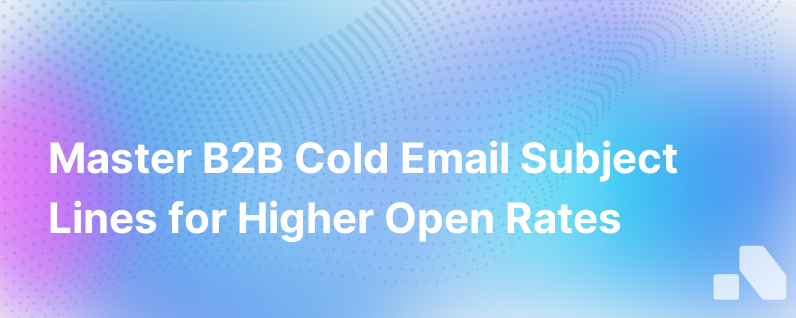
Email remains a cornerstone of B2B communication despite the proliferation of social media and other digital marketing channels. It's direct, professional, and when done correctly, can open doors to invaluable business opportunities. However, with the ever-increasing volume of emails flooding inboxes, the first and perhaps most significant challenge is capturing attention. The subject line is your foot in the door; it determines whether your email gets opened or lost in the digital abyss.
Here are insights and strategies for crafting subject lines that elevate your cold email from an unwelcome guest to a must-read message.
1. Clarity is King
A clear and direct subject line beats a clever but obscure one every time in the B2B environment. Your prospects are busy professionals who value their time—make sure your subject line communicates exactly what your email is about.
Example: "Increase Your Sales Team's Efficiency - See How"
This subject line is straightforward and hints at the value proposition right away. It sets clear expectations about the email content.
2. Personalization Doesn't Mean Just "Insert Name"
Personalization is a powerful tool, but using the recipient's name isn't the only way to personalize a subject line. Referencing specific business needs, industries, or recent events relevant to the recipient can significantly increase open rates.
Example: "Improving [Company's Name] Customer Engagement - Tailored Strategies"
You've personalized it to their company, and you've identified a potential area of interest or need.
3. Nail the First Impression
You have one shot to make a good first impression. Tease them with an enticing offer or interesting fact that makes opening the email irresistible.
Example: "Exclusive Insight: [Industry] Trends Shaping 2023"
This subject line intimates that there's privileged information within and leverages the recipient's fear of missing out (FOMO).
4. Spark Curiosity But Avoid Deception
While sparking curiosity is an effective strategy, make sure not to mislead your prospect. Clickbait subject lines can increase open rates initially but will eventually tarnish your credibility.
Example: "Is Your CRM Missing These Critical Features?"
It piques interest by suggesting there might be something unknown and immediately important about their current toolset.
5. Keep It Short and Sweet
With mobile devices accounting for a significant portion of email opens, brief subject lines are more necessary than ever. A good rule of thumb is to keep it under 50 characters or about 6-10 words.
Example: "5 Proven Steps to Streamline Workflow"
This concise subject line informs recipients what to expect—concise, actionable information—in a quick skim.
6. Leverage Timeliness and Urgency
When appropriate, suggesting urgency can prompt a quicker open, but this tactic should be used sparingly to avoid fatiguing your audience.
Example: "Ends Today: Complimentary B2B Sales Audit"
This demonstrates the immediacy of the offer and compels swift action—if they're interested in the audit, they won't delay.
7. Align with Current Events or Trends
If your email content is aligned with a current event or a trending topic, incorporate that into your subject line to boost relevance and timeliness.
Example: "Case Study: Remote Sales Success During the Pandemic"
It shows relevance to what's happening in the world, which could be top of mind for the recipient.
8. Incentivize Opening
Sometimes it helps to state the incentive outright, especially if you're offering something of value like a white paper, webinar, or tool demonstration.
Example: "Get Your Free E-Book: B2B Prospect Engagement"
By clarifying the benefit (a free e-book), the subject line sets clear expectations for what the recipient gains by opening the email.
9. Use Numbers or Lists
Numerical data can catch the eye more quickly than words. If your email includes a list or statistical data that could benefit the prospect, mention it in your subject line.
Example: "7 Strategies to Optimize Your Sales Funnel"
The use of numbers implies organized, easy-to-digest content awaits the reader.
10. A/B Test Your Subject Lines
What works for one industry or audience may not work for another. The only way to refine your strategy is through A/B testing different subject line styles and keeping track of the results.
Example: You might test "Quick Question about [Industry Challenge]" versus "How to Overcome [Industry Challenge] This Quarter" and compare the open rates.
A/B testing helps you to understand what resonates best with your audience.
Conclusion
Effective subject lines are the gatekeepers of your cold email campaigns. They should be clear, personalized, and aligned with the needs and interests of your recipients. Keeping them short, but promising value, will entice a busy professional to pause and engage. Through careful crafting and ongoing A/B testing, you can continuously improve your subject lines for better open rates and ultimately, more successful email outreach.
Remember, the goal is not simply to get your prospect to open the email, but to take the desired action once they have read it. Your subject line is your first impression, but make sure the content delivers on its promise.
When these tips are executed correctly, even the coldest email can warm up a prospect to the idea of a conversation with you. And for those looking to simplify and enhance their email campaigns, consider the power of AI platforms like Aomni that tailor your approach with data-driven insights, ensuring your cold outreach is as effective as possible.